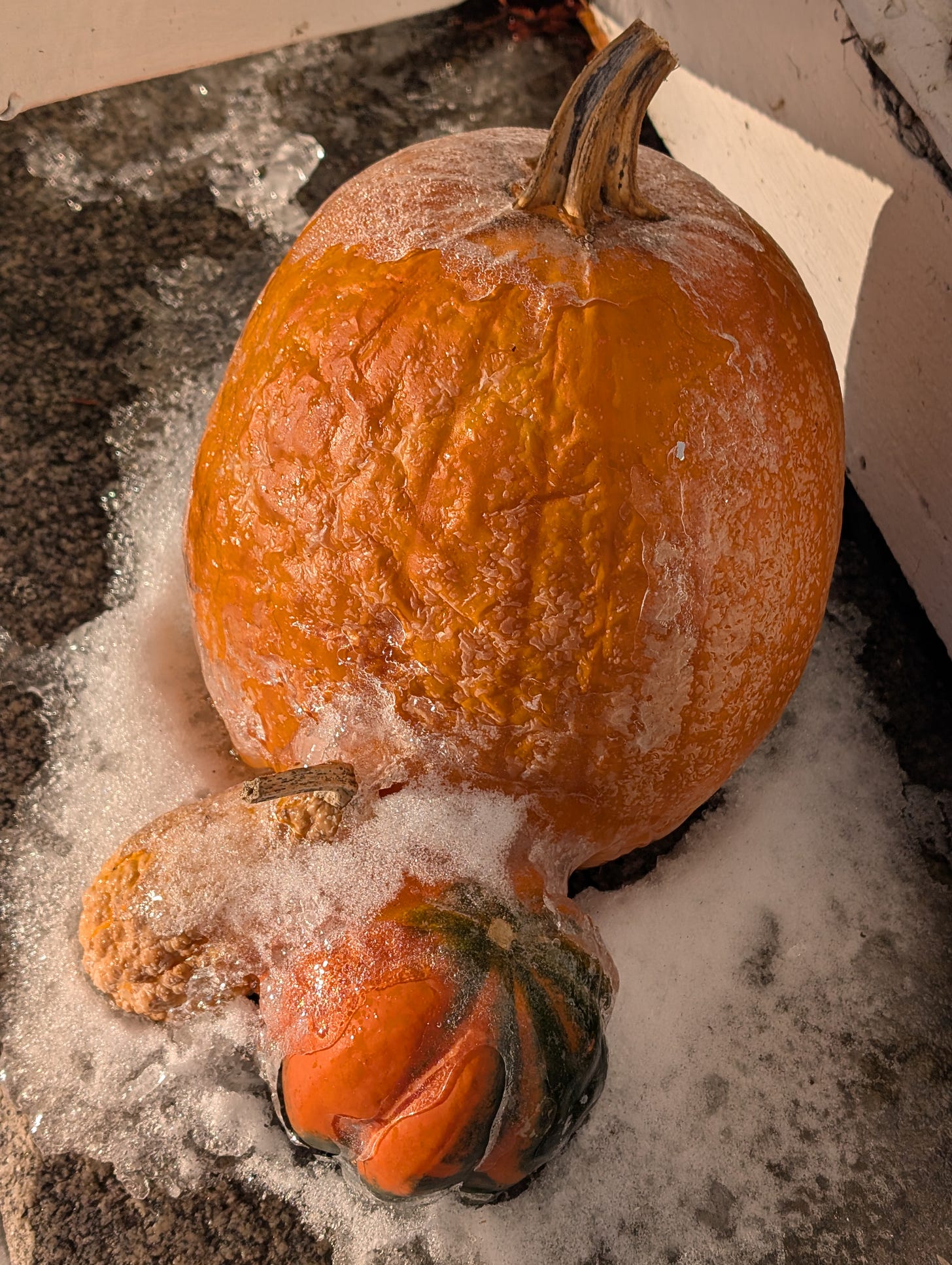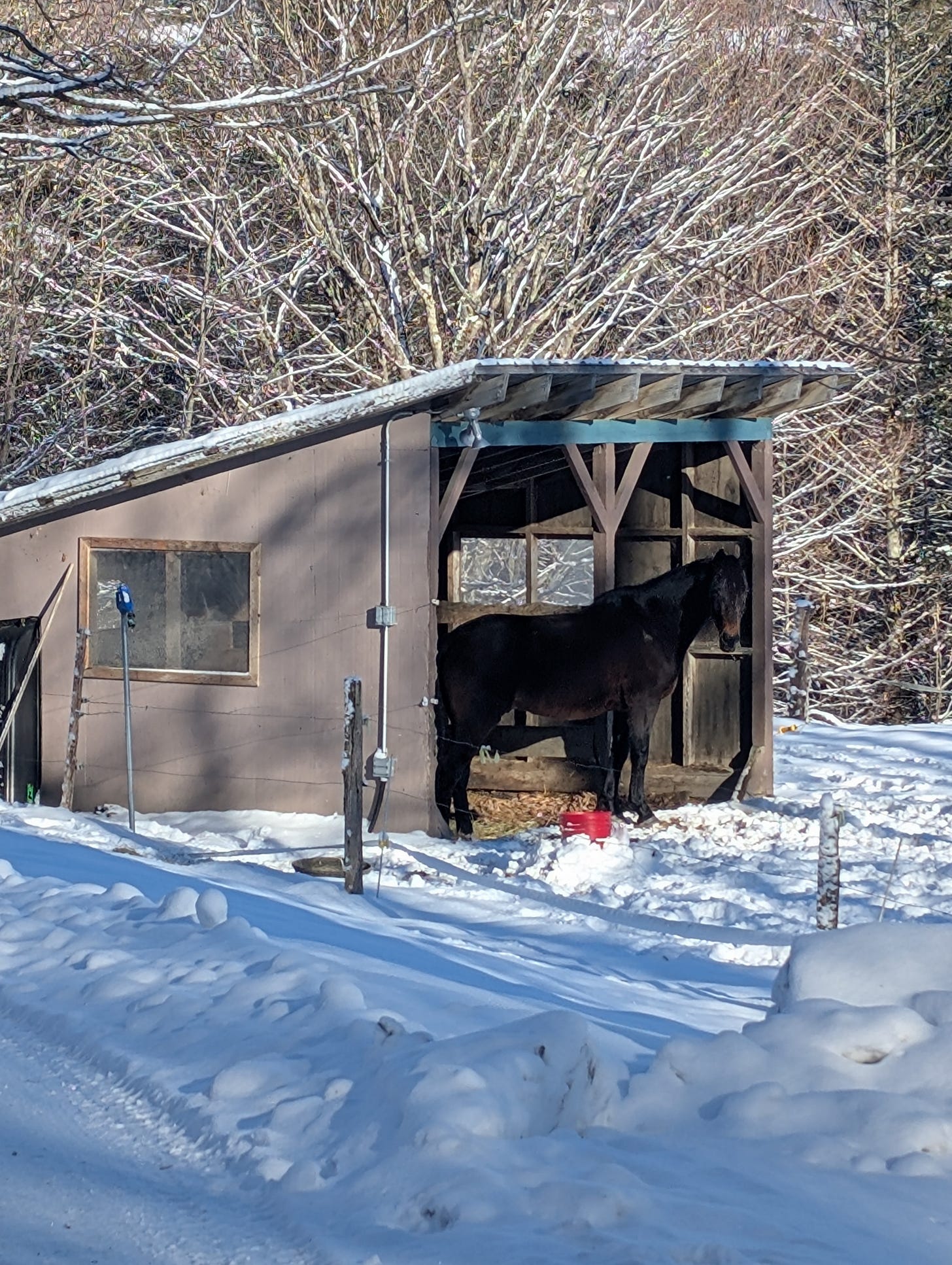The Dirt And the Fruit
Third Sunday of Advent
With joy you will draw water from the wells of salvation.
Isaiah 12:3
We continue our walk through Advent with the candle of Joy. But first, we’re going to talk about John the Baptist and trees.
Advent is John’s season, and John does not mince words to the sprawling crowds coming to see him. “You brood of vipers! Who warned you to flee from the coming wrath?” (Luke 3:7) Well, that’s direct. From John’s perspective, these swarming crowds coming to him were there for all the wrong reasons, maybe even mindlessly following each other, and must have looked like creeping, crawling snakes rolling over the hills to get cheap grace (they seemed to think being Abraham’s descendants was all they had to do).
After rebuking them, John turns to this tree metaphor, “Bear fruits worthy of repentance,” then challenging them to be living, fruitful trees (3:8-9). What does bearing good fruit look like to John? Nothing fancy, nothing deep, just some practical generosity, loving your neighbor as if they were you; if you were cold, you would put a coat on yourself. If you were hungry, you would give yourself food. So if your neighbor is cold, or hungry, take care of them. That’s a tree bearing fruit.1
It’s interesting that John uses this image of a tree bearing “good fruit” because our Advent themes are also Scriptural good fruit. This wasn’t always the case; the older tradition of Advent before our pretty candles was called “the Four Last Things,” which are Death, Judgment, Heaven, and Hell, which is what John’s talking about here. But as the Advent wreath tradition took on a cheerier tone, the choices for the evolving tradition of the Advent wreath just happened to be “good fruit,” almost exactly the first four fruits of the Spirit from Galatians 5:22: love, joy, peace, and patience (which is always closely linked to hope). So what does it mean for us, then, for Joy to be a fruit of the Spirit? And why is it so important?
These Fruits are First God’s Fruits
The late pastor Tim Keller used to say that because joy is a fruit of the Spirit, we know that joy is a characteristic of God; God is joyful. Is this at odds with your image of a stoic, stern God? Consider that theologically, when we say “fruits of the Spirit,” we mean “fruits of the Holy Spirit.” In other words, these fruits are first God’s fruits. Love, joy, peace, patience (or hope), and the rest are fruits we strive for because they are qualities of God. God is hopeful, God is peaceful, God is loving, and God is joyful.
Some Christians have tended to think that a God of these fruits is at odds with the Old Testament. But a peaceful God is in the Old Testament with all his shalom, a flourishing life of peace, because when all else fails, his peace is never overwhelmed. He’s not always hopeful in the ways we wish he’d be hopeful, because he knows us too well to be optimistic about our human plans, but he doesn’t let that overwhelm his hope. And maybe God doesn’t always seem that happy, in fact he gets quite angry, but his anger is temporary, while his joy is everlasting. He rejects things and people all the time, saying, “Their ways are not my ways,” But he is love, his love is everlasting, and his rejection is temporary and reversible.
And if this doesn’t quite make sense yet, let’s think about our own complex emotions.
Blue Christmases and Blue Comedians
As long as I remember, I’ve wanted to be around more and more authenticity, whatever that meant. As a teenager, my closet was full of black t-shirts. I liked emo stuff, sad art, somber films, all that. When I tell people I used to do standup comedy in Los Angeles, people’s eyes light up like I’m about to bring joy to them, but I was one of the least joyful comedians you’d ever meet. Cynical, dour, taking things way too seriously, and it didn’t help I was addicted to a million things. I could still get that way years later, and if I’m honest, I still can. I’d like to think there’s a gift there in my disposition, like my friend who describes himself as a “joyful curmudgeon.” And he is. Well, that’s good for him, but often I can only manage to be a plain bagel curmudgeon. (We do need joyful curmudgeons. We need to understand, appreciate, and use people with different personalities in the Body of Christ, some of whom have been in this very church. But for reasons that I hope become clear, the joyful part is key.)
In recent years, I’d say we have made improvements and gotten more emotionally complex as a culture in wanting to affirm our “bad” or difficult emotions. And I support this with things like the Blue Christmas services and our general acceptance that life is hard and full of suffering and it’s unhealthy to pathologize grief, anger, and more. And I love that. I love when people passionately and skillfully process anger to fight for what’s right, I love people being real, I love putting on a chaplain’s hat and just being with people having a hard time. It’s real.
But sometimes, like an overly serious artist, we might let our sorrow win in the name of realism. For me it’s because I didn’t want to shut it out, I didn’t want to be a spiritual bypasser, I didn’t want to be fake happy, I wanted to be authentic. But if we do this, it’s actually really important that while we process and honor the gifts of these harder emotions and attitudes, they are not the same as the fruits of the Spirit. They feed the fruits.
Sometimes, it still feels more comfortable to be sad and melancholic. The greatest thing God has to overcome in me is an inner Frenchman in a beret with a cigarette. Even then, we need our melancholic artists who honor the dark, who are open and vulnerable with despair, who can paint evil with a meticulously accurate brush. Sometimes they’re the only ones who can do that, who are willing to do that, like a great sad film or a Flannery O’Connor short story where the hope, peace, joy, or love is just so faint. You may hear it in one character uttering one line of hope in a hopeless story, one line from a child of love in a loveless story, or one joke of levity in a humorless story. But we need something to point us to the truth that evil is not going to win.
Sometimes in our own lives, our joy might be the size of a mustard seed today. But like the seed of faith, that mustard seed of the Holy Spirit’s joy can grow and grow with God’s help through each other.
Overcoming By Including
The cross did not deny any sorrow, any sin, or any pain, but embraced it, the blood of Christ watering something new. This same pattern came through in the genius of Pixar’s Inside Out ten years ago. The main character is an emotion, an animated Joy, who lives inside a little girl. Joy tries to cast out another emotion, Sadness, to keep control of happiness, making for a tyrannical joy. What happened is that everything broke down. She entered a true depression. It was only when Joy included and incorporated Sadness—and Anger, and Fear, and Disgust—that Joy could actually flourish, bringing about true shalom peace with hope and love. This is exactly what Jesus Christ did and what he still does for you and me and all of us with our pain.
We know God’s Joy, in its very essence, is naturally inclusive of everything for one big reason: it’s eternal. Think about what it means to say God has eternal joy by thinking about how eternity cuts both ways. It’s not just in the future looking toward heaven, eternity is also in the past and the present. It is a Joy that is fully in all of time, bringing in all that ever was. If we know anything about the past or the present, it’s that there are a lot of truly awful, evil things.
And yet God’s hope, peace, joy, and love were present throughout it—not because he leaves those who suffer out of his joy, but precisely because he gathers them in. He even uses his curmudgeons for his joyful good.
If you’ve ever had that experience of reading one of the prophetic books beyond what is read in church services, you may be confused. “Wait, I thought they were just saying, good stuff’s coming. But these prophets are kinda mean!” They are upset, and they show that God also can be very upset and live in the dark, telling us all the things that are not him and that he rejects. But if you keep reading, the prophets always come back to a place where God’s hope, peace, joy, and love have included all the pain, evil, and awfulness of humanity, and on the other side of it all, God has said, “I am still hopeful, peaceful, loving, and I am still Joy.” Or as he says in the last words of the prophet Zephaniah:
The Lord, your God, is in your midst, a warrior who gives victory; he will rejoice over you with gladness; he will renew you in his love; he will exult over you with loud singing as on a day of festival. I will remove disaster from you, so that you will not bear reproach for it. I will deal with all your oppressors at that time. And I will save the lame and gather the outcast, and I will change their shame into praise and renown in all the earth. At that time I will bring you home, at the time when I gather you.
Zephaniah 3:17-20
Christmas, Incorporated
The Joy we light on the Advent wreath is because God has incorporated the sadness of his people. He has come into the “400-year silence” after Malachi, during which God had not spoken to his people. He comes into the midst of a people in trouble, and he says, “I have not forgotten you or any of your pain, but I will overcome it. And if you believe in me, you can overcome it with me.”
Going back to John the Baptist again, remember what joy fruit looks like: helping your neighbor. Earlier in this Advent series, we talked about cruciform, or cross-shaped, hope and peace. Christian joy is cross-shaped, too, for true Joy is a joy that gives of itself to others who need it. If we are to bear this fruit, it is not just for ourselve, but to give that fruit away. The fruit of the true tree of life is meant to be given.
If Joy is one of God’s fruits, then Jesus Christ is that tree of life that never stops bearing fruit. Here’s one way to think of it: Alan Watts was this hippie philosopher from the 1960s, and while I don’t listen to him anymore or even really like him, one thing I liked was how he described an apple tree as a living thing. “We call it an apple tree why? Because it makes apples. Apple trees are just apple-ing. It's just what they do.” And in a similar way, he said, the universe is “people-ing.” In the same way, if Christians are really living in a relationship with God and the Holy Spirit through Jesus Christ, then we are meant to be Christ-ing—producing fruits of Christ’s tree. Because the fruits of hope, peace, joy, and love are just what Christ’s tree does. What does an apple tree do? It makes apples. What does following Jesus do? It makes fruit of the Spirit. It doesn’t fall into either side of the ditch, which is either ignoring our sorrow, our pain, our anger, any of that, or glorifying any of that, but bearing fruit that takes it all in, and from it creates a life in the Spirit.
We can hold the precious fruit of our Joy just like a candle holds it as a flame. If Jeremiah called us clay pots, we might also be nothing more than some wax and wicks. Maybe your wick is blackened and burnt, the wax sliding off from where it used to hold firm. But the purpose of a candle is not to have a charred piece of rope or to be nicely put-together wax. The purpose of a candle is to hold a flame.
God has chosen you to be his candle that can hold Joy. Even if you haven’t felt like that in a long time, or ever, he has chosen you to bear that fruit, and you can and will grow in giving that fruit through him. Not because you cast out your grief, but because you know where it is.
And where is the grief, the pain, the mess? They’re in the soil. They might even have some crucial nutrients. But they’re not the fruit. If you’re too cynical, too in love with your pain, you’re not being “real” and eating from the tree of knowledge, you’re just eating dirt. At least know the dirt is real. Maybe you haven’t seen or tasted real fruit in some time, if ever, or you can’t remember when.
But as real as your pain is, your pain is not fruit. It’s the dirt that The Good Tree lives in, takes in, and turns into the fruit of deep Joy that only could possibly come from being born of dirt. Taste, eat, and find someone who needs it.
h/t At Home With the Lectionary for discussion of John and Fleming Rutledge’s Advent book








